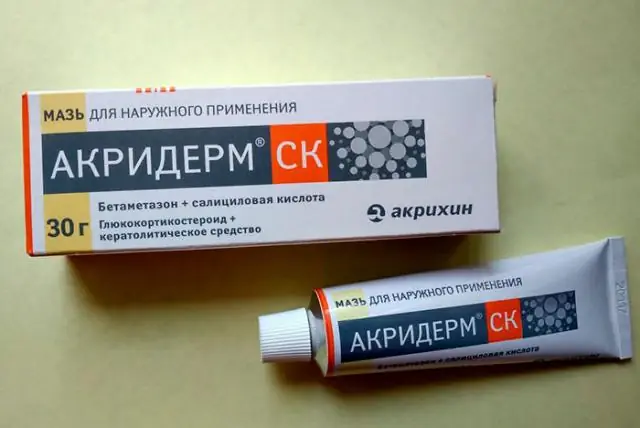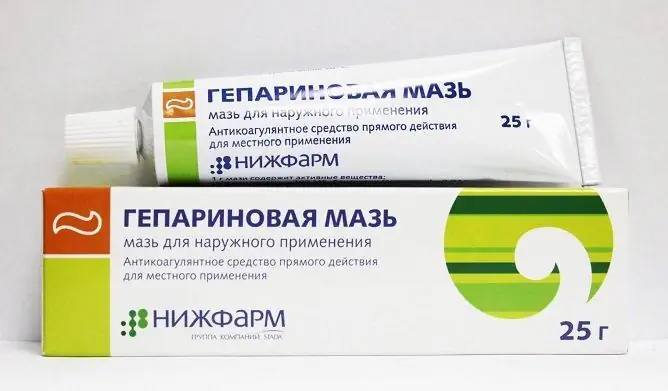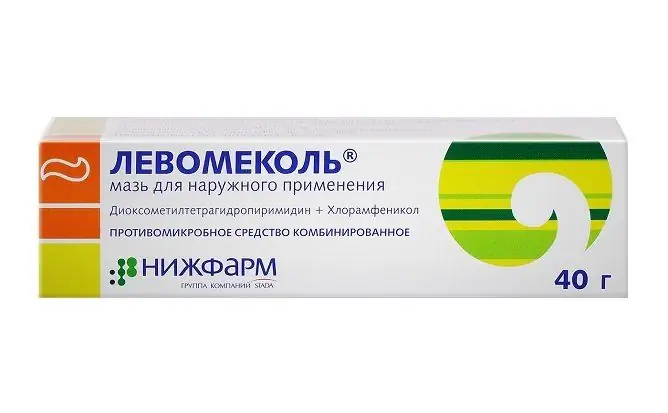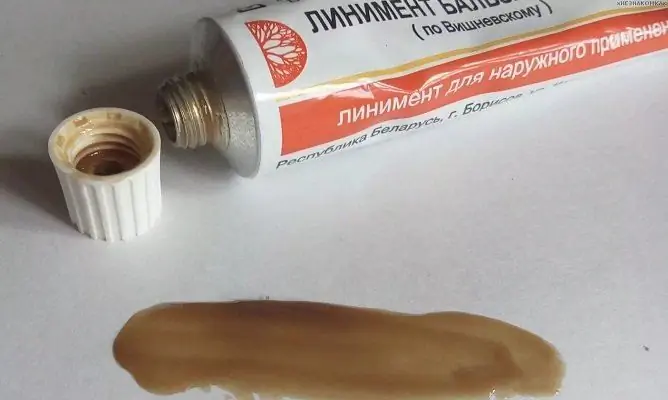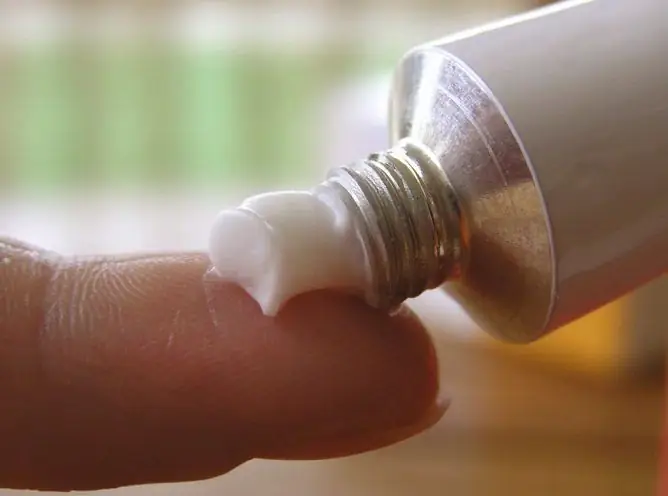- Author Rachel Wainwright [email protected].
- Public 2023-12-15 07:39.
- Last modified 2025-11-02 20:14.
Akriderm SK
Akriderm SK: instructions for use and reviews
- 1. Release form and composition
- 2. Pharmacological properties
- 3. Indications for use
- 4. Contraindications
- 5. Method of application and dosage
- 6. Side effects
- 7. Overdose
- 8. Special instructions
- 9. Application during pregnancy and lactation
- 10. Use in childhood
- 11. Drug interactions
- 12. Analogs
- 13. Terms and conditions of storage
- 14. Terms of dispensing from pharmacies
- 15. Reviews
- 16. Price in pharmacies
Latin name: Akriderm SK
ATX code: D07XC01
Active ingredient: salicylic acid (salicylic acid) + betamethasone (betamethasone)
Manufacturer: Akrikhin, JSC (Russia)
Description and photo update: 2019-16-09
Prices in pharmacies: from 227 rubles.
Buy

Akriderm SK is an ointment for the treatment of skin diseases, including those caused by an allergic reaction and bacterial infection.
Release form and composition
The drug is produced in the form of a white ointment with a cream shade for external use, with a slight specific odor (in tubes of 15 g and 30 g, in a cardboard box 1 tube and instructions for use of Akriderma SK).
1 g contains 640 μg of betamethasone dipropionate and 30 mg of salicylic acid.
Excipients - petroleum jelly and liquid paraffin.
Pharmacological properties
Pharmacodynamics
Akriderm SK is a combined external agent. It has anti-inflammatory, antiseptic, anti-allergic and keratolytic effects.
The effects of the drug are determined by the properties of its active ingredients:
- salicylic acid: has antimicrobial and keratolytic effects. Promotes deeper penetration of the glucocorticosteroid and removes horny layers;
- betamethasone dipropionate: is a glucocorticosteroid. It has anti-allergic, anti-inflammatory, anti-exudative, antipruritic and anti-edema effects. Prevents the formation of inflammatory edema. Promotes inhibition of the accumulation of leukocytes, the release of pro-inflammatory mediators and lysosomal enzymes in the focus of inflammation, inhibition of phagocytosis, and a decrease in vascular tissue permeability.
Indications for use
Ointment Akriderm SK is indicated for the treatment of chronic and subacute dermatoses, which are accompanied by hyperkeratosis and are sensitive to external corticosteroid therapy:
- Limited and diffuse neurodermatitis;
- Dyshidrotic dermatitis;
- Eczema;
- Psoriasis;
- Ichthyosis and ichthyosiform changes;
- Lichen planus.
Contraindications
- Hypersensitivity to drug components;
- Perioral dermatitis;
- Lupus;
- Viral skin infections;
- Rosacea (rosacea);
- Vaccination.
Therapy with Akriderm SK in children under 1 year old is contraindicated, over 1 year old - should be carried out with caution.
There are no data on the safety of local exposure to the drug during pregnancy.
If the agent is prescribed during lactation, it is necessary to refuse breastfeeding during its use.
Akriderm SK, instructions for use: method and dosage
Ointment Akriderm SK is applied to the inflamed skin surface with a thin layer in the morning and evening. The frequency of application is 1-3 times a day, the exact dosage is set by the doctor based on individual indications.
Usually, the course of treatment is 3-4 weeks. If a longer treatment is required, the drug can be used once every 2 days.
If a secondary skin infection develops, adequate antifungal and antibiotic therapy may be required.
Side effects
Akriderm SK rarely causes side effects. Locally, they can manifest themselves as:
- Itching;
- Burning;
- Folliculitis;
- Striae;
- Acne;
- Skin atrophy;
- Depigmentation;
- Hypertrichosis.
It is extremely rare with long-term treatment that systemic side effects may occur, such as:
- Nausea;
- Vomiting;
- Drowsiness;
- Fatigue;
- Pallor;
- Growth retardation;
- Cushing's syndrome;
- Confusion of consciousness;
- Hyperventilation and tachypnea;
- Hyperglycemia;
- Glycosuria;
- Hypokalemia;
- Increased blood pressure;
- Hearing impairment.
The ointment should not be applied to the skin near the eyes. Long-term treatment with facial skin ointment is not recommended due to the risk of developing perioral dermatitis, rosacea, skin atrophy or acne.
Overdose
The development of an acute overdose is unlikely.
The main symptoms (with prolonged or excessive use): signs of hypercortisolism, including hyperglycemia, glucosuria, manifestation of Cushing's syndrome, reversible suppression of the function of the adrenal cortex.
Therapy: symptomatic. In case of chronic toxic effects, a gradual cancellation of Akriderm SK is recommended.
special instructions
When signs of hypersensitivity reactions to the components or skin irritation appear, the abolition of Akriderm SK and the selection of adequate therapy are indicated.
Systemic absorption of the drug is possible during a long therapeutic course, applying the agent to large areas, in the case of using occlusive dressings.
Atrophic changes after prolonged use of Akriderm SK on the skin of the face may appear more often than on other surfaces of the body. In this case, the duration of the course should not exceed 5 days.
The ointment is not intended for use in ophthalmology. Avoid getting Akriderm SK in the eyes.
After prolonged use, the ointment should be withdrawn gradually.
Application during pregnancy and lactation
- pregnancy: the use of the drug is possible only in cases where the expected effect outweighs the possible risk. Long-term therapy and / or high doses are not recommended;
- lactation period: therapy is contraindicated because the safety profile has not been studied.
Pediatric use
- up to 1 year: therapy is contraindicated;
- from 1 year: Akriderm SK should be used exclusively according to strict indications under the supervision of a physician, which is associated with the likelihood of systemic adverse reactions of betamethasone. In the case of using the ointment on large surfaces and / or under an occlusive dressing, suppression of the function of the hypothalamic-pituitary-adrenal system and symptoms of hypercortisolism may occur. Other possible complications: increased intracranial pressure, decreased excretion of growth hormone.
Drug interactions
The interaction of Akriderma SK with other drugs / substances, confirmed by clinical studies, is absent.
Analogs
Analogs of Akriderm SK are: Kanizon, Triderm, Akriderm Genta, Elokom S, Betasalik, Triakutan, Belosalik, Betaderm A, Diprosalik, Betasal, Rederm, etc.
Terms and conditions of storage
Store at 15-25 ° C. Keep out of the reach of children.
The shelf life is 3 years.
Terms of dispensing from pharmacies
Available without a prescription.
Reviews about Akriderm SK
Reviews of Akriderm SK indicate that the therapeutic effect in most cases develops quickly. At the same time, it is noted that only the skin symptoms of the disease are eliminated. The disadvantages include quick addiction and the development of side effects, especially with prolonged use.
Price for Akriderm SK in pharmacies
The approximate price for Akriderm SK is 230-274 rubles. (1 tube of 15 g) or 356-404 rubles. (1 tube of 30 g).
Akriderm SK: prices in online pharmacies
|
Drug name Price Pharmacy |
|
Akriderm SK ointment for external use 15 g 1 pc. 227 r Buy |
|
Akriderm SK ointment 15g 233 r Buy |
|
Akriderm SK ointment for external use 30 g 1 pc. 352 r Buy |
|
Akriderm SK ointment 30g 440 RUB Buy |

Maria Kulkes Medical journalist About the author
Education: First Moscow State Medical University named after I. M. Sechenov, specialty "General Medicine".
Information about the drug is generalized, provided for informational purposes only and does not replace the official instructions. Self-medication is hazardous to health!

